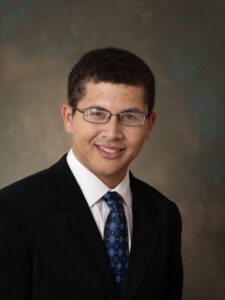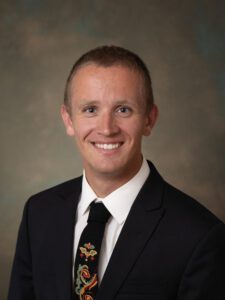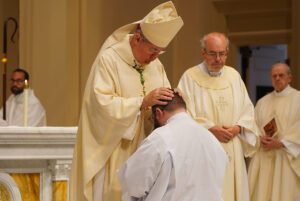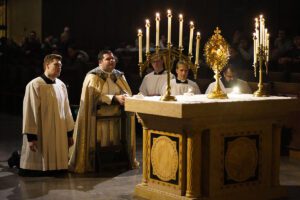“Arise! For this matter is your responsibility, but we will be with you: be courageous and act!”
Whether you’re talking about our individual lives or the global and national situation, the world can seem like a confusing place. It is undoubtedly so for young people attempting to find their path in life, trying to figure out where God is leading them, especially if they feel called to the priesthood or religious life.
That’s why the theme for the Diocesan Vocation Office this year comes from the 10th chapter of the Book of Ezra. The Book of Ezra tells the story of the Israelites returning to Jerusalem after almost a century of exile. After being away from their homeland and Temple for so long, they were confused, frightened, and unsure where to go next. At that moment, God called upon a priest, Ezra, to guide them on their path. It was his responsibility to lead, but God provided him with other people to assist him along the way.
At every moment in the life of the Church, we need Catholics to arise and live out their vocation. No one can tell someone else where God is calling them, but all of us are responsible for assisting one another in listening to the call.
There are many ways in which the Vocation Office, along with our parishes, can offer this help. From high school groups, to retreats for men and women, to the Project Andrew Dinner and Leave a Mark Mass, the Vocations Office offers something for everyone.

One of the most exciting new initiatives is the formation of Regional Vocation Centers. Four have been set up so far, with more to come. Annunciation Parish in Hazleton, Saint Matthew Parish in East Stroudsburg, Christ the King Parish in Archbald, and Saint Maria Goretti Parish in Laflin offer a variety of resources for young men considering priesthood – regular discernment dinners where men join with others considering the same call, opportunities to shadow a priest for a day, spiritual direction, Eucharistic Adoration, and private weekend retreats are just some of the possibilities.
In addition to our Vocation Centers, the Diocese has invited Rhonda Gruenewald of Vocation Ministry to offer workshops for priests and parishioners here in northeastern and north central Pennsylvania. Vocation Ministry focuses on building up vocations right in our parishes. You, the Catholic faithful of the Diocese of Scranton, can help our young men and women courageously listen to God’s voice and arise to follow him.
Thank you for listening to God’s voice in your own lives and for all the work you do in helping others discern their vocation. It is time for us in the Diocese to arise, be courageous, and act – the Holy Spirit is calling.




